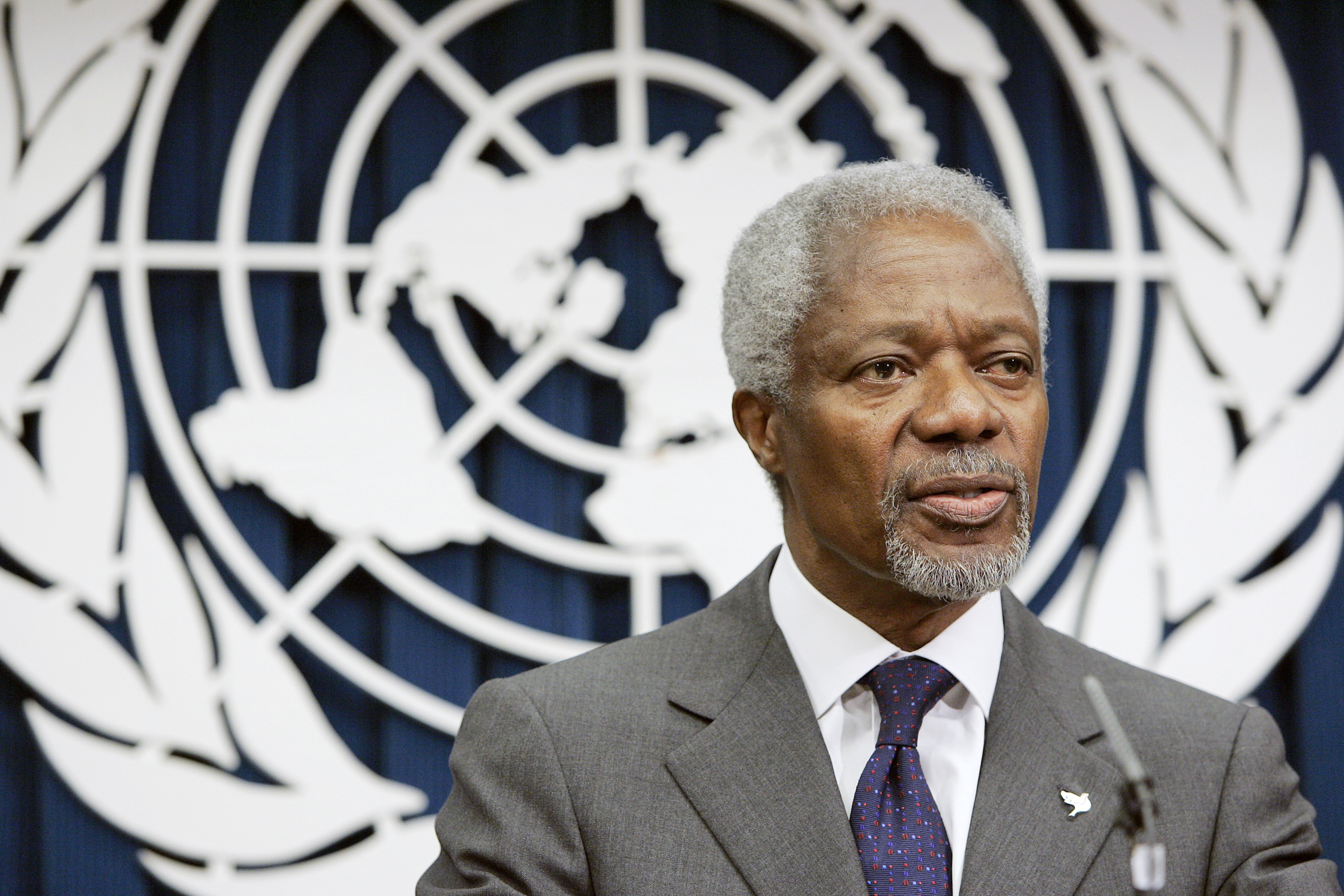On December 21, 2004, United Nations Secretary-General Kofi Annan opened his annual end-of-year press conference with a dour description of the twelve months that had just passed. On that day, he stood before a packed press room to deliver an earnest assessment of events that threatened the UN and his personal reputation, including scandal in his administration. While in total control of the moment, he was clearly shaken by the turmoil racking the organization.
“There’s no doubt that this has been a particularly difficult year,” Annan said in response to a reporter’s question, “and I am relieved that this annus horribilis is coming to an end.”
Annan, who died August 18 at the age of 80, was a veteran in working with the media. His recognition of a “horrible year” represented something of a departure from his incessant optimism, but it is emblematic of the seriousness with which he treated the press throughout his long career at the UN.
Related: The intrepid reporter who got expelled from the UN
Annan’s conduct with reporters—at that press conference and throughout his time as secretary-general—is a testament to his life’s work, his office, and the UN ideal. It also suggests a model for coexistence between the media and those organizations they cover, even under tense circumstances.
The period around the December 2004 press conference was among the most difficult of Annan’s tenure. The UN had been unable to prevent war in Iraq, and conflicts raged around the world. A suicide attack against the UN’s Baghdad compound convulsed the organization, and Annan had come under scrutiny as part of the investigation into corruption within the UN’s Oil-for-Food humanitarian program. There was a general sense that the secretary-general was losing his leadership grip.
In the moments preceding the Iraq war, Annan had adopted a more strident voice against what he had perceived as a march toward conflict. His approach earned him respect in some quarters, but it also drew the ire of others, who resented the activism of the world’s chief diplomat. Prior to that seminal December press conference, Annan endured endless, often negative attention from a press corps that stalked him from the doorway of his Beekman Place residence to the entranceways and hallways throughout the UN compound.
But Annan didn’t shun reporters. In fact, he accepted some of the criticism that was levelled at him. Annan understood the role of the media to signal democratic ideals, balance unrestrained power, and sometimes act as an agent for discomfort in what many perceive as the soft-cushioned easy chair of the diplomatic establishment. By denying or demeaning the media, Annan might have done a better job of protecting himself, but he would have sent mixed signals to those around the world who look to the UN and leaders like Annan to set the tone. His response to reporters seemed graced with the knowledge that his actions were being watched in countries where many still struggle to come to terms with the job of the press.
Annan fully recognized the media’s fourth estate status, respected how reporters work, and understood how to manage media even when operating under a severe disadvantage.
Questions at that 2004 press conference veered at times to the personal, referring to Annan’s family and inner circle. “I know that certain quarters have been quite persistent in attacking the UN and me, but there have also been some constructive criticisms, which we accept,” Annan said—a signal that not even the world’s top diplomat was beyond reproach.
Annan had a long relationship with the press corps. Prior to becoming secretary-general, he had served as the head of the UN’s peacekeeping department and had worked in a variety of roles throughout the organization. Annan was well-liked by many of the resident correspondents; his disarming, fatherly demeanor made him a standout in a building already brimming with charismatic diplomats. He beamed with pride alongside his secretariat colleagues after receiving the Nobel Peace Prize, but he was also never able to erase the stains of genocide in Rwanda and Bosnia. The press saw it all.
Annan—and the UN, under his charge—seemed to apply a number of principles in their work with the media. They fully recognized the media’s fourth estate status, respected how reporters work, and understood how to manage media even when operating under a severe disadvantage. Even in the darkest days of his administration, Annan’s UN stretched itself to accommodate journalists, tending tirelessly to a global press corps working under rolling international deadlines.
Annan may have made tactical decisions to bypass journalists at times, but he never took the strategic decision to limit press access or diminish the role of the media. Even when racing to meet his schedule and coaxed by staff to walk past a press stakeout, Annan was rarely able to resist his impulse to address reporters. If nothing else, he would typically offer a turn of the head and an open hand that implied “I’ll be right back to you.”
From the archives: What can the UN do for press freedom?
David Hirsch is a former resident correspondent at the United Nations. He is currently studying globalization in the Master of Arts in Liberal Studies program at Dartmouth College.

